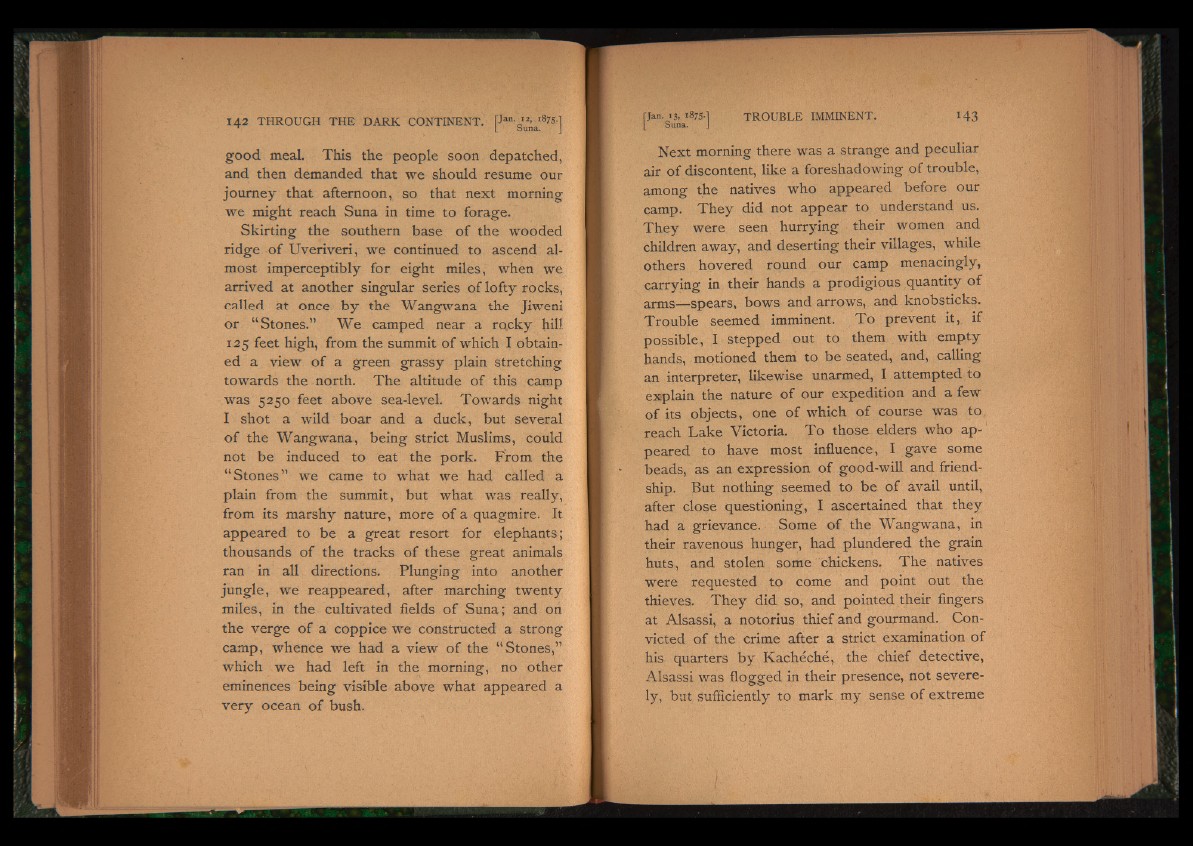
g o od meal. This the people soon depatched,
and then demanded that we should resume our
journey that afternoon, so that next morning
we might reach Suna in time to forage.
Skirting the southern base o f the wooded
ridge o f Uveriveri, we continued to ascend almost
imperceptibly for eight miles, when we
arrived at another singular series o f lofty rocks,
called at once b y the Wangwana the Jiweni
or “ Stones.” W e camped near a ro ck y hill
125 feet high, from the summit o f which I obtained
a view o f a green grassy plain stretching
towards the north. The altitude o f this camp
was 5250 feet above sea-level. Towards night
I shot a wild boar and a duck, but several
o f the Wangwana, being strict Muslims, could
not be induced to eat the pork. From the
“ Stones” we came to what we had called a
plain from the summit, but what was really,
from its marshy nature, more o f a quagmire. It
appeared to be a great resort for elephants;
thousands o f the tracks o f these great animals
ran in all directions. Plunging into another
jungle, we reappeared, after marching twenty
miles, in the cultivated fields o f Suna; and oh
the ve rg e o f a coppice we constructed a strong
camp, whence w e had a view o f the “ Stones,”
which we had left in the morning, no other
eminences being visible above what appeared a
v e ry ocean o f bush.
[Jan. 13, 1875.1 TROUBLE IMMINENT. 143
[ Suna. J
Next morning there was a strange and peculiar
air o f discontent, like a foreshadowing o f trouble,
among the natives who appeared before our
camp. T h e y did not appear to understand us.
T h e y were seen hurrying their women and
children away, and deserting their villages, while
others hovered round our camp menacingly,
carrying in their hands a prodigious quantity o f
arms— spears, bows and arrows, and knobsticks.
Trouble seemed imminent. T o prevent it, if
possible, I stepped out to them with empty
hands, motioned them to be seated, and, calling
an interpreter, likewise unarmed, I attempted to
explain the nature o f our expedition and a few
o f its objects, one o f which o f course was to
reach Lake Victoria. T o those elders who ap-'
peared to have most influence, I gave some
beads, as an expression o f good-will and friendship.
But nothing seemed to be o f avail until,
after close questioning, I ascertained that they
had a grievance. Some o f the Wangwana, in
their ravenous hunger, had plundered the grain
huts, and stolen some chickens. T h e natives
were requested to come and point out the
thieves. T h e y did so, and pointed their fingers
at Alsassi, a notorius thief and gourmand. Convicted
o f the crime after a strict examination o f
his quarters b y Kacheche, the chief detective,
Alsassi was flogged in their presence, not severely,
but Sufficiently to mark my sense o f extreme